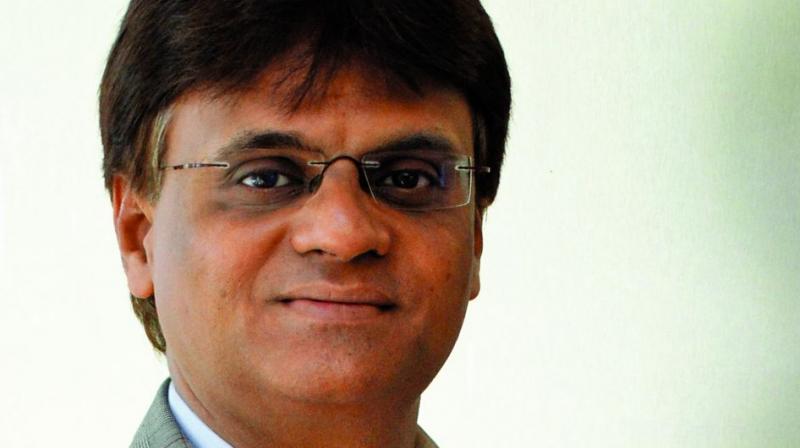Sunday Interview: Cyrus Mistry should have acted in a more dignified manner'
In an interview with Olga Tellis, Mr Choksey says that there was a clear lack of communication between the company and its chairman.

Deven Choksey, promoter, K.R. Choksey Group, says that the Tata Group could have avoided the issue it had with its chairman Cyrus Mistry from coming into the public domain. In an interview with Olga Tellis, Mr Choksey says that there was a clear lack of communication between the company and its chairman.
How do you view the spat between the Tatas and former chairman Cyrus Mistry?
I think it’s for the first time that the performance of the Tata Group has been asserted with the objective of requiring correction of the ailing health of the respective companies. Cyrus Mistry was probably starting to challenge the legacy thinking which could have rubbed some people within the organisation on the wrong side. While his objective of restructuring the group was noble, maybe the method of executing this entire objective was not as noble. It could have been better handled as the legacy of over a 100 years cannot be wished away in a hurry. It is unfortunate that instead of resolving the differences in-house, it has come out in public. This has definitely not gone down well for insiders as well as outsiders. I would have imagined that such a respectable group of promoters like the Tatas could have managed the situation better than the current outcome that we are experiencing.
Do you think that Cyrus Mistry was treated unfairly?
Being an outsider, I would not know personally what affected one another. It would be unfair to level a comment when one is not a party to such discussions and interactions. I don’t think it happened overnight and there must have been some dialogue for some time. So it would not be fair to say the group did not take the decision with enough thought. It is a most disciplined group.
Does this episode dent the image of the Tatas?
According to me, all this is a part of corporate life. The group should get back at operating with grace and recover its image. Dirty linen washed in public does no good.
One of the reasons given for Mr Mistry’s ouster is that he did not observe the ethos and culture of the Tatas.
What guarantee is there that the next person appointed will? The legacy requirements of the group cannot be continued by another generation. It’s a mindset and it would be difficult to adjust. A group is many people, managers etc., and when you deal with them operationally and in the boardroom it is two different things.
The Tatas seem to have a problem when choosing a successor to the incumbent. It happened when Ratan Tata took over from JRD Tata. They had to face protests from rival claimant, the then chairman of Tata Steel, Russi Mody.
Any group with a long history will face such problems. It happens even in the case of families where there is a generation gap. In this case, the person was not from family but part of the stakeholder group so it was a challenge. There have been situations where companies like Lehman Brothers and Wells Fargo, which are not family-run groups, but had legacy issues. So it’s not necessarily only in family-owned businesses that there are legacy problems. Wherever there are humans there will be problems!
Looking at a wider perspective, how do you see this fracas between Mr Mistry and the Tatas?
I think largely the problem is one of lack of communication. If there is communication it leads to trust and, ultimately, serves the purpose. There was obviously not enough effective and adequate communication for a person who held the position of chairman. It’s the case of an outsider not communicating to the stakeholders and vice-versa.
Do you think Mr Mistry crossed the lakshman rekha by coming out with information on the finances of the company that he was privy to? Did he betray his fiduciary duty?
I don’t think so. He has to communicate this information but it should have been done at a shareholders’ meeting. Basically the outcome has to be thought of. He should have acted in a more dignified manner.
Will the task of the new chairman be more challenging with these disclosures of the losses that the company has on its books?
It will always be challenging for anybody who will assume the responsibility at the highest level — whether the disclosures were put across or the new chairman finds out these things himself. The task can never be easy.
Would it be difficult for the Tatas to find a new chairman given what has happened?
I don’t think so. Given the kind of reputation that the house of Tatas have, there will be no problem in inviting the right person for the job. There will be people willing to work for the Tatas. Everything has its own shelf life and this episode too could have its own shelf life. It will not last forever. So given the size of the opportunity one gets to handle as head of the Tata Group, why won’t they come? They will take this opportunity and every opportunity is a challenge.
The shares of the group have been taking a beating for the last few days. Where do you see this going?
The Tata Group has been doing a lot to contain the damage. They have been systematically calling meetings of different investors and addressing their concerns. They have started “investor days”. So they have not delayed in addressing the concerns expressed.
How do you think the market will take this $18 billion loss that the group will have over the next few years?
I believe that you must not concentrate on this one figure ($18 bn) that has been mentioned till both parties give their versions. One should not take a one-sided view on these figures. Fortunately, the conduct of the group is not questionable when it comes to compliances. They comply with audit requirements. One cannot generalise but investors will buy on merit of the respective companies. On Friday, Tata Motors was favoured. There will be select buying of companies at lower levels.
Do you think there will be an end to the war of words between the two parties?
This is an open-ended question. Mr Mistry cannot afford to do more damage to his own investment. His family has an 18.5 per cent shareholding in Tata Sons. I think it is not the time to speculate more on this subject. Let the situation unfold and hope for the best.
What does this mean for corporate India? What message is there for India Inc?
This sends alarm signals to corporate promoters to stay in communication with all stakeholders. The biggest example we have of a communicator is our Prime Minister Narendra Modi who communicates a lot with everybody and has found acceptance not only in India but abroad. One who holds a top position must communicate well.

